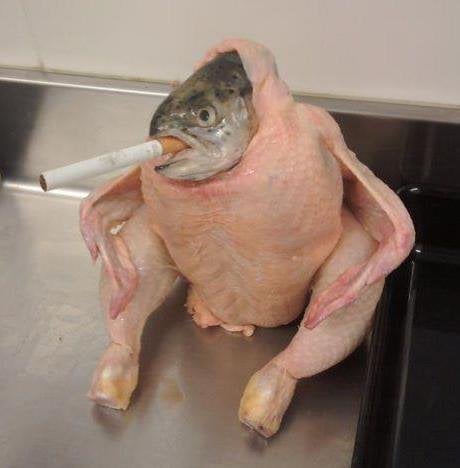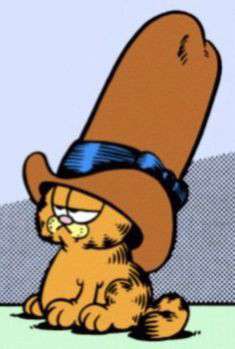The horse’s name was “had”.
James, while John had had “had”, had had “had had;” “had had” had had a greater effect on the teacher.
😠
You must be loving all the technically correct comments on this post
“That that” spoken are two different sounding words so it makes sense. When it goes from verbal to written and I see it, I will almost always try to rephrase things to avoid that combo. It just jumps out as totally wrong.
are they? I just said “I didn’t know that that was how it is” out loud and both thats sound the same
In fluent speech, the conjunction (the first “that”) is unstressed, and as a result some speakers reduce the vowel a bit toward schwa. However, if you told those speakers to carefully pronounce each word, I bet they would pronounce the conjunction and the pronoun the exact same same. A more common example of this kind of reduction is the word “to”, which is almost always reduced to /tə/ ([tə] ~ [tʊ] ~ [ɾə] depending on dialect and surrounding words) in everyday speech when unstressed.
Fun fact, you can reduce just about every unstressed vowel in English to schwa (if it’s not already a schwa) and still be largely understood.
It’s called weak forms, this video goes into a lot of details about them, has examples of “that that” as well: https://youtu.be/qlbGtEg68x4
The A is slightly more emphasized in the second that. It’s subtle
must be regional I guess
Could be. So you say them exactly the same and not an inflection shift?
No, why would I
Because you generally put more emphasis on the subject in English
I’ll try and pay attention next time I have to say that that or if someone else says it. I think reading it and over thinking it makes it sound weird
English has its flaws, but I don’t agree that that is one of them.
Live footage of me reviewing a report that has a repeated word series like this:

I showed my teacher a flork and now she loves them
Hahaha holy shit, some of them are way the fuck out there
Buffalo buffalo Buffalo buffalo buffalo buffalo Buffalo buffalo.
What makes this a “flaw”? Also, show me a " flawless" language (a real one, not loglang or whatever)
“I would never! Not unless you were already having been going to do that!”
“wha-?”
“You heard me!”
I present the present as a present to all those present in the present tense.
Incoming James While John
Many of the at least 400 words that are technically both nouns and verbs depending on usage can form sentences of just repeating the word.
Buffalo buffalo buffalo Buffalo buffalo.
Echoes echoes echo Echoes’ echoes.
Mrs Miss misses misses’ Miss.
Fly flies fly.
Tests “test” test tests Tests’ test.
Reasons reason reasons.
In German the following is a completely valid sentence:
Wenn hinter Fliegen Fliegen fliegen, fliegen Fliegen Fliegen nach.
Which translates to when flies fly behind flies, then flies follow flies. The same works for seals:
Wenn hinter Robben Robben Robben, robben Robben Robben nach.
Some Hungarian prefixes can be piled on without limit, while still creating meaning.
The word “úszni” means “to swim”.
Úsztatni - to make someone or someone swim
Úsztattatni - to make someone make someone swim
Úsztattattattattattattattattattni - to make someone make someone make someone … make someone swimCan be done with any verb, and maybe some other suffixes as well.
Wow, that’s wild. Amazing language
It’s basically a mishmash of Ancient Ugric, Turkish, German, Slavic and Romani words with grammar that is an eldritch monstrosity, nobody really knows where it came from, and it is seriously weird.
There are only two real tenses, but nineteen cases and two different ways of doing imperative, which are kind of equivalent but carry cultural and tonal differences in certain contexts.
Strangely enough, this works in Finnish too:
Uida - to swim
Uittaa - to make someone or something swim
Uitattaa - to make someone make someone swim
Uitattattattattattattattattattaa - to make someone make someone make someone … make someone swim
It’s almost as if they are related languages or something.
The same works in Dutch:
Als vliegen achter vliegen vliegen, vliegen vliegen vliegen achterna.
Although my favourite form of that tongue twister is:
Als vliegende vliegen achter vliegende vliegen vliegen, vliegen de vliegende vliegen vliegensvlug.
When flying flies fly behind flying flies, the flying flies fly rapidly (“flying fast”).
English has Buffalo Buffalo Buffalo Buffalo Buffalo Buffalo Buffalo
I don’t know what it means but I’ve been told it is indeed a full sentence.
Bison from Buffalo, New York bully bison from Buffalo, New York who bully other bisons.
Wenn hinter Robben Robben robben, robben Robben Robben nach.
FTFY
The landlord of a pub called The Pig And Whistle asked a sign writer to make a new sign. When he saw it he thought that the words were too close together so he said to the sign writer “I want more space between Pig and And and And and Whistle”.
Buffalo buffalo, Buffalo buffalo buffalo, buffalo Buffalo buffalo.
I think you or they added two extra ands, because the pub isn’t “Pig And And Whistle.”
Space between pig and and, and space between and and whistle
Yes but they have two too many, go count it.
It is indeed a very convoluted way of making the requests. I would say more space between each word.
No, more space between Pig & And + And & Whistle.
(Pig and And) and (And and Whistle)
Ah see this one makes more sense but since it is a single sentence clause two of them are still redundant.
They refer to the same and twice.
then it should be separated by comma after the first and and
I don’t believe that’s accurate.
There are only two things in the list, pig & whistle.
They want more space between pig and &.
They also want more space between & and whistle.
If we were listing three areas where they want additional space we would need at least one comma, and I would argue for the Oxford comma as well, however we are only listing two areas where we want more space and so no comma is needed.
Sure it’s nearly unreadable, but I think the punctuation is correct.
If the same and is referred to twice then it should be a separate sentence clause requiring use of a comma. Since there is no comma there is no indication the and is the same both times.
Imagine saying “It was just me and dave and dave went driving” instead of “It was just me and dave, and dave went driving.” Yeah, maybe its the same dave, possibly readable, but its wrong.
“Pig and Whistle” is what they’re asking for.
Pig
.
And
.
Whistle
But they gave instructions for “Pig And And Whistle” in the comment I replied to.
Pig & And, And & whistle. It’s focusing on the conjunctive. ’And’ is repeated because it is pertinent in both phrases.
More space between pig and and as well as between and and whistle.
Yeah thats a proper sentence but thats not what was written above.
Nah, it’s referring to the first space by grouping the first and second words, “Pig” and “And,” and then referring to the second space by grouping the second and third words, “And” and “Whistle.”
They said and “And” and “And” and “Whistle” tho, thats 2 extra.
“The Pig And Whistle” asked a sign writer to make a new sign.
“I want more space between “Pig” and “And”
and
[more space between] “And” and Whistle
Ovahea’s comment as I copy and paste is
Pig and And and And and Whistle”.
So if you remove the bonus ands, it becmes “Pig And And Whistle”.
But as someone else pointed out it’s the same “and”. The sign has three words on it. Between the words are spaces. How many spaces are there? What on either edge of each space?
Okay I concede that it works, albeit it requires a comma, but it also works without the redundant ands
Inspired by the story, another landlord decides to name their pub “Pig and And and And and Whistle.” Lo and behold, the sign was cramped… Ther needed more space between Pig and and and and and And and And and and and and and And and And and and and and and Whistle.
You shut your whore mouth.
Have fun. Or an aneurysm, whichever:
Given the fact that that poem is 100 years old, I would have thought that English would have evolved to fix these issues by now. Oh well.
We need a new language I guess. Maybe it’s time to switch to the most popular language in the works (in terms of number of native speakers): Mandarin Chinese.
Maybe better use second most popular: Spanish, it at least uses same letters (differently though ¯\_(ツ)_/¯)
As someone who has studied it, have fun with that. While that poem is an outlier, there’s still a ton of things that not even inflection or context can solve.
Buffalo buffalo Buffalo buffalo buffalo buffalo Buffalo buffalo!
I still feel like the nouns are in the wrong place when I read this.
I’m reading it as “New York cows new York cows bully bully New York cows”
When I want it to read “New York cows bully new York cows” which would be “Buffalo buffalo buffalo Buffalo buffalo” which isn’t enough buffalo.
I have to inset my own “that” to be able to get my head around “Buffalo buffalo (that) Buffalo buffalo buffalo buffalo Buffalo buffalo”













